

However, Singapore has the second highest road fatality rate when compared to four similar sized cities namely Tokyo, London, Hong Kong and Seoul. Despite having a higher road fatality rate than London and Hong Kong, Singapore's rate of accidents per 100,000 cars is far lower. This shows that Singapore has fewer road accidents as compared to other cities. However, those accidents are more severe.
In this resource centre, we will be going through some methods that traffic police use to promote road safety in Singapore and some suggestions they can implement as well.
Road accident statistics in Singapore 2020. Last Updated: January, 2020.
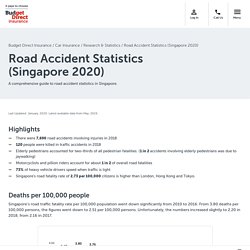
Latest available data from May, 2019. Highlights There were 7,690 road accidents involving injuries in 2018120 people were killed in traffic accidents in 2018Elderly pedestrians accounted for two-thirds of all pedestrian fatalities. (1 in 2 accidents involving elderly pedestrians was due to jaywalking)Motorcyclists and pillion riders account for about 1 in 2 of overall road fatalities73% of heavy vehicle drivers speed when traffic is lightSingapore’s road fatality rate of 2.73 per 100,000 citizens is higher than London, Hong Kong and Tokyo. Deaths per 100,000 people Singapore’s road traffic fatality rate per 100,000 population went down significantly from 2010 to 2016. Road Traffic Fatality Rate per 100,000 Population (2009 – 2018) Trends. Operant Conditioning.
How Reinforcement and Punishment Modify Behavior Operant conditioning, also known as instrumental conditioning, is a method of learning normally attributed to B.F. Skinner, where the consequences of a response determine the probability of it being repeated. Through operant conditioning behavior which is reinforced (rewarded) will likely be repeated, and behavior which is punished will occur less frequently.
By the 1920s, John B. Watson had left academic psychology, and other behaviorists were becoming influential, proposing new forms of learning other than classical conditioning. Skinner's views were slightly less extreme than those of Watson (1913). The work of Skinner was rooted in a view that classical conditioning was far too simplistic to be a complete explanation of complex human behavior. Operant Conditioning. What Is Reinforcement? Psychology, Definition, And Applications.
By: Toni Hoy Updated February 11, 2021 Medically Reviewed By: Whitney White, MS.
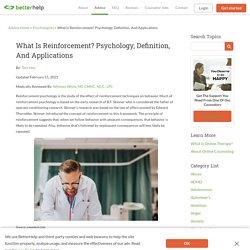
CMHC, NCC., LPC. The Study of Punishment in Psychology. Punishment is a term used in operant conditioning to refer to any change that occurs after a behavior that reduces the likelihood that that behavior will occur again in the future.
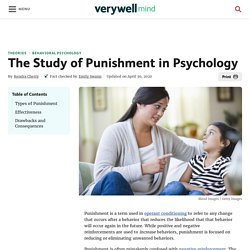
While positive and negative reinforcements are used to increase behaviors, punishment is focused on reducing or eliminating unwanted behaviors. Punishment is often mistakenly confused with negative reinforcement. The difference: Reinforcement increases the chances that a behavior will occur and punishment decreases the chances that a behavior will occur. Certificate of Merit. What is it? And how can you get one? Getting a driver’s licence ensures that you are qualified to drive.
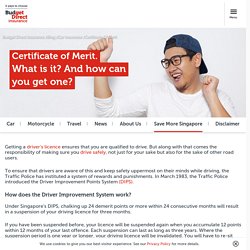
But along with that comes the responsibility of making sure you drive safely, not just for your sake but also for the sake of other road users. To ensure that drivers are aware of this and keep safety uppermost on their minds while driving, the Traffic Police has instituted a system of rewards and punishments. In March 1983, the Traffic Police introduced the Driver Improvement Points System (DIPS). How does the Driver Improvement System work? Under Singapore’s DIPS, chalking up 24 demerit points or more within 24 consecutive months will result in a suspension of your driving licence for three months. If you have been suspended before, your licence will be suspended again when you accumulate 12 points within 12 months of your last offence. For most drivers, the fear of racking up demerit points for traffic violations is a sufficient deterrent against reckless driving. Certificate of Merit explained. Current. ComfortDelGro Driving Centre - DIPS Retraining - Traffic Police.
Current. Making Singapore roads safer. SINGAPORE: A slew of measures has been announced to make Singapore roads safer, among them a stiffer penalty for traffic offences near schools.
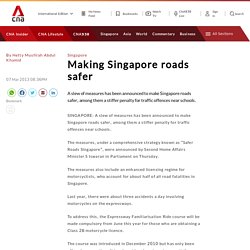
The measures, under a comprehensive strategy known as "Safer Roads Singapore", were announced by Second Home Affairs Minister S Iswaran in Parliament on Thursday. The measures also include an enhanced licensing regime for motorcyclists, who account for about half of all road fatalities in Singapore. Last year, there were about three accidents a day involving motorcycles on the expressways. To address this, the Expressway Familiarisation Ride course will be made compulsory from June this year for those who are obtaining a Class 2B motorcycle licence. Current. Traffic Offences in Singapore: Demerit Points & Composition Fines (2020 Update) (Photo Credit: Singapore Police Force) Updated: 25 August 2020 Here is the full list of traffic offences that carry demerit points and composition fines in Singapore.
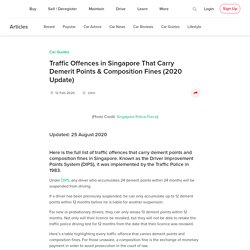
Known as the Driver Improvement Points System (DIPS), it was implemented by the Traffic Police in 1983. Under DIPS, any driver who accumulates 24 demerit points within 24 months will be suspended from driving. If a driver has been previously suspended, he can only accumulate up to 12 demerit points within 12 months before he is liable for another suspension. Current. Current. Suggestion. Ways You Can Promote Safety on the Road. It has been calculated that around 2.5 million Americans will be injured in a car accident or other motor vehicle crash each year, and approximately another 37,000 will lose their lives.
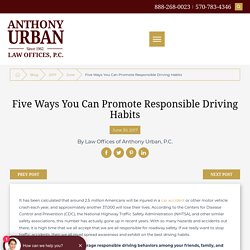
According to the Centers for Disease Control and Prevention (CDC), the National Highway Traffic Safety Administration (NHTSA), and other similar safety associations, this number has actually gone up in recent years. With so many hazards and accidents out there, it is high time that we all accept that we are all responsible for roadway safety. If we really want to stop traffic accidents, then we all must spread awareness and exhibit on the best driving habits. Here are five ways you can encourage responsible driving behaviors among your friends, family, and community: Drive sober: Never get behind the wheel after you have been drinking.
Suggestion. Suggestion.